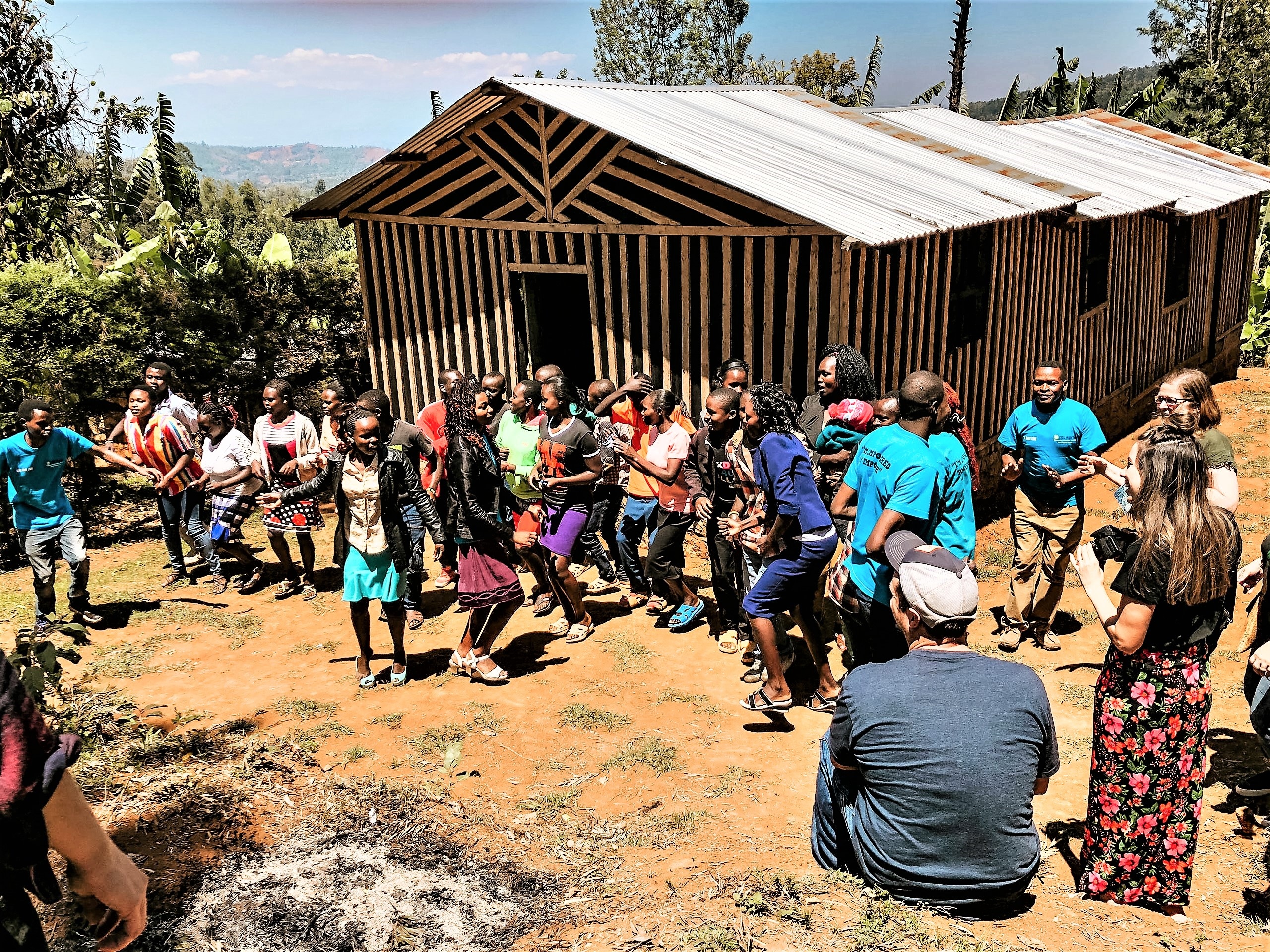by Dennis Dalman
news@thenewsleasders.com
by Dennis Dalman
news@thenewsleasders.com
In faraway Kenya, a boy named Titus grabbed his brother and fled what had once been his family farm. At night they had to sleep in trees for fear of dangerous animals and possibly just-as-dangerous people.
Their father had died and then their mother had been poisoned before some mean people moved in and took over the farmland. Titus and his brother were suddenly orphans, helpless and alone in the world. Sad to say, such cruel crimes and displacements are not uncommon in Kenya, as elsewhere.
That’s the bad news. The good news is Titus and his brother are now doing fine, thanks to a mission program dubbed We Are Zoe. Now 21, Titus owns a restaurant, plans to study to be a psychologist and currently helps others who were in such dire straits like him and his little brother.
The Titus success story is one of many sad but ultimately inspiring stories a group of Sartell residents is sharing with others after a recent trip to Kenya. The 15 people are members of The Waters church in Sartell, which sponsors a Zoe group in Kenya. One of the members, Tina Schmidt, is the United States Midwest director for the We Are Zoe organization. In a recent interview with the Sartell-St. Stephen Newsleader, another group member, Liz Schultz shared highlights of the group’s mission trip to Kenya.
Schultz
Liz Schultz owns Unique Design, an interior-design company; and co-owns with her husband, Ryan, the engineering firm of Schultz Engineering and Site Design in Sartell. The couple has three boys – Tom, 16; Josiah, 13; and Daniel, 11.
A member of The Waters church, Schultz joined the other 14 members for the one-week trip to Kenya. Schultz participated in a previous (non-Zoe) labor-work mission trip to El Salvador with a delegation from The Waters.
We Are Zoe
We Are Zoe, Zoe being the Greek word for “life,” was founded in 2004 by the Conference of the United Methodist Church and African community leaders, We Are Zoe is an organization that empowers orphans to acquire the skills and confidence they need to survive, to thrive through self-sufficiency and connections with others.
The Zoe organization was inspired by the Christian call for people to help one another, especially vulnerable children. A North Carolina United Methodist Church spearheaded the Zoe movement after learning about a 15-year-old African girl who felt called to care for AIDS orphans in her country.
The group went through many changes, from a focus on charity to models for empowerment and self-sufficiency. Now, groups of orphans attend Zoe schools for three years and have access to basic training and resources needed to grow their own food, start businesses, enroll in various schools, attend vocational training, learn how to prevent diseases, learn about their legal rights as children and develop positive connections with others.
According to Zoe board members, there is an 85 percent success rate for empowering orphans into self-sufficiency. They, in turn, contribute to Zoe and help it grow into more successes for more orphans. More than 70,000 orphans have been empowered via Zoe, and it takes only a $90 contribution per year per child to sustain the program. The young women Zoe graduates often start businesses related to seamstress work, clothing tailoring and beauty salons because there is a high demand for those services in Kenya. Many boys become farmers or farm workers, barbers, small grocery shop owners and other forms of work. And a number of young boys and girls go onto further schooling to become professionals in various careers.
Zoe participants tend to be in their mid- to late-teens.
Purity
Schultz told the story of a young woman named Purity. An orphan, she worked as a house cleaner for clients who treated her very badly. She earned $20 a month and struggled to support her younger siblings.
After graduating from the Zoe program two years ago, she became a seamstress in her own shop with two employees, and now she is training other Zoe orphans. She made enough money to help her siblings get back into schools.
Purity even returned to the clients who had treated her so badly, and they apologized and re-established a comfortable relationship with her, contributing to the Zoe program.
Answer to poverty
After landing in Nairobi, Kenya, The Waters group was driven to a mountainous area to visit some of the Zoe groups. Although there were interpreters on hand, they were mostly not needed because almost all Kenyans speak excellent English. The country, Schultz noted, was a colony of Britain for many decades until its independence in the 1960s.
They were welcomed by a jubilant group of dancing and singing children, all of them nearing graduation from the three-year Zoe program.
“It was pure joy,” Schultz said. “We joined in and danced with them. The weather was beautiful there, but we danced so hard we were sweating.”
The second day The Waters delegation met another Zoe group of orphans in their second year of the program and the next day spent time with a group in their first year.
“They were awesome to see,” Schultz said. “There were about 100 of them, including siblings, so about 30 families total. In their first year, they were already thriving. It was so apparent that this (Zoe) is the answer to poverty among orphans.”
The last group they met were not so thriving, however. The children had just started the Zoe program a month ago.
“The kids all held their heads down,” Schultz said. “They were so scrawny (from malnutrition), and they had no hope in their eyes. There were about 25 to 30 children in that group. We heard terrible stories, heartbreaking stories. Our hearts just broke, and there was a lot of sobbing.”
It was a long, sad ride back to the group’s quarters.
“It was so heartbreaking, but I just know those kids will be doing well in a few months,” said Schultz, referring to the other groups now thriving.
What so impresses Schultz and others is how Zoe graduates raise and pool money and then give hands-on help to keep the program going. The self-sustaining mission of Zoe is being constantly extended, making more groups possible, more successes.
The group from Sartell was so elated by the successes they saw first-hand, they intend to sponsor more Zoe groups in the near future. They welcome contributions and volunteers to help out. The effort is nondenominational and so anyone can contribute or even go along on a trip.
“Some churches sponsor as many as 12 or 15 Zoe groups per church, especially churches in the American South,” Schultz said. “So many thousands of orphans have been helped and not just in Kenya. In other African countries like Rwanda, and now in India, too.”
For more about the Zoe organization, visit www.wearezoe-net.
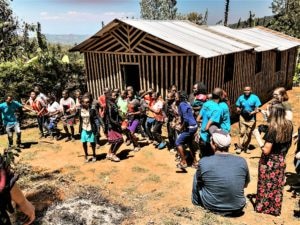
A Zoe group in Kenya welcomes its sponsors, the Waters church group members from Sartell, with a jubilant outpouring of singing and dancing.
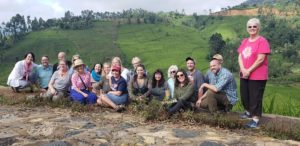
Tea plantations are very common in the east African country of Kenya and employee many people. The Waters church mission members took a break for a group photo in front of one of the tea fields. In the back row (left to right) are Tina Schmidt, Troy Payne, Waters Church Pastor Jeff Olson, Katie Virnig, Liz Schultz, Sara Shosted, Mary Houk, Emily Rundquist, Lisa Nemeth, Pamela Flint (of Texas), John Morris and Calvin Teubner (face not visible); front row (left to right) Gail McCarty, Kelsey Dennison, Jessica Schwartz, Alyssa Teubner, Kara Welter (photographer for the Zoe project), Micah Tremain (Zoe videographer) and Thanet Flint (of Texas).
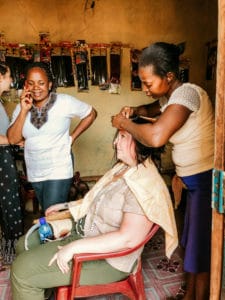
The Waters church group visited many salons in Kenya that are often staffed by teenagers who learn salon jobs via the Zoe program. In this photo, Sartell resident Liz Schultz gets her hair braided with a red-extension braid.
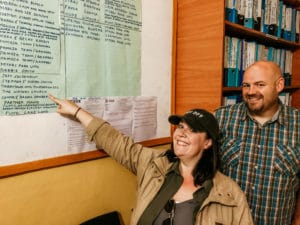
Liz Schultz of Sartell points to the roster board of Zoe donors, along with the church’s pastor, Jeff Olson. The Waters church group is one of many worldwide groups that support the work of the Zoe movement in developing countries.

Zoe group members, close to graduation, welcomed their sponsors from Sartell’s Waters church with a joyous, celebratory dance and welcomed their guests to join in the merriment. On the left is a young woman named Dorcas. In the middle is Liz Schultz and at right is Gail McCarty, both of Sartell.
.



